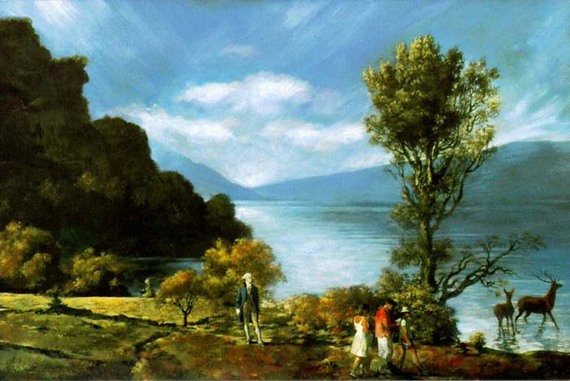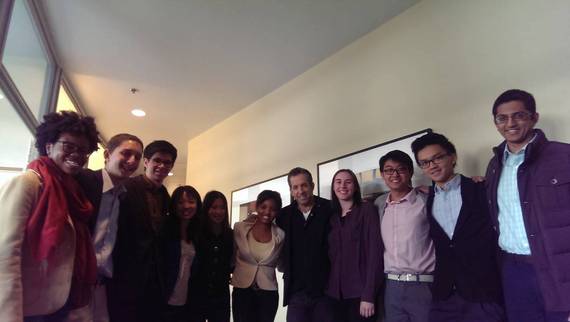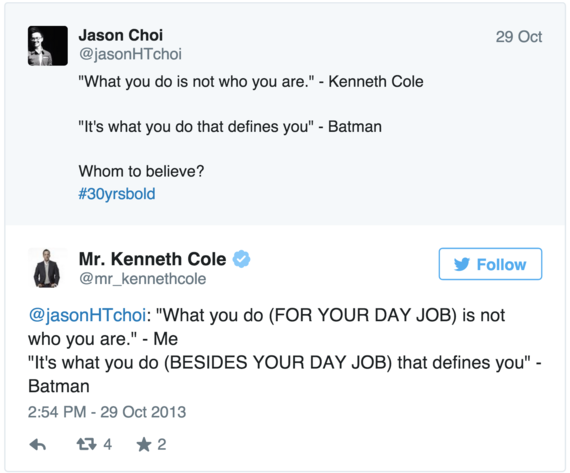"What do you want to be when you grow up?" is quite possibly among the most ambiguous questions ever asked, second only to "who let the dogs out?" and "turn down for what?"
It is therefore understandable that my friend seemed overwhelmed by what she perceived to be caustic sarcasm from my inner hippie when I provided "I want to be happy" as an answer. After all, the usual expected answer tends to be a lot narrower in scope: when a person asks, "what do you want to be?" they probably mean, "what do you want to do as your day job?"
Ancient Philosophers and Job Hunting
American designer Kenneth Cole, known as much for his fashion line as he is for his social activism, is quick to notice the difference between the two. In a visit to the University of Pennsylvania, he pointed out that "what you do is not who you are". To the uninitiated, Cole's take on self-identity may seem counterintuitive: after all, intellectuals dating back to ancient Greece have supported the idea of a defining purpose in life that is achievable through productive toil. Doing is defining.
As noted by cultural thinker Roman Krznaric in his book How to Find Fulfilling Work, Aristotle is among the first to point out that every person has "some object for the good life to aim at...with reference to which he will then do all his acts". Theologian John Calvin supported the idea of a "calling", stating that whatever vocation God has chosen for a man must be executed to the best of his abilities. A farmer must grow crops diligently to fulfill God's bidding, and a fisherman better fish some damn fine trout. Even German philosopher Friedrich Nietzsche, perhaps the grumpiest of them all, believed that "he who has a why to live can bear almost any how to live."
Finding a Job and Yourself
Bringing it closer to our time, Wharton Business School professor Charles Dwyer (check out this famous lecture by him) has an exercise that his MBA students use to identify a specific career that creates the most meaning in their lives. The exercise involves writing down a complete list of everything you like (even if it's impersonating Gollum from Lord of the Rings, which I am reasonably known for within a very select circle of friends), categorizing those things under their similarities, until finally revealing one or two value statements (generalities such as "I like to create" or " I like to deliver social impact in the developing world"). You are then to find a career in an industry that best caters to these central tenets in your life.
While it is a helpful inductive exercise to find out what you care about in life and the jobs that may best cater to those passions, it may lead to the erroneous conflation of who you are and what you do for work. In a culture that defines a person based on his/her job, it seems only reasonable to plan fastidiously and pinpoint conclusively a job that perfectly reflects your beliefs and interests.
In a culture that defines a person based on his/her job, it seems only reasonable to plan fastidiously and pinpoint conclusively a job that perfectly reflects your beliefs and interests.
Krznaric disagrees. He notes, "the biggest mistake people make (in choosing jobs) is to follow the traditional 'plan then implement' model...but it typically doesn't work. You might get a new job, but despite your expectations, it is unlikely to be fulfilling". In fact, job seekers across the world are starting to adopt a new method called the "radical sabbatical": rapid job-hopping over a year or two to determine what one is truly interested in.
While this method may be deemed too unconventional and unsustainable for many, one understanding has emerged. Job hopper Laura Van Bouchout - who changed her job over 30 times in a year -- compares job search to dating:
"When I was single I had a mental list of qualities I thought my boyfriend should have. But some guys who met all the criteria on my list did nothing for me. And at one point you find someone who doesn't meet half your checklist but blows you away. I think that's what you have to look for in a job."
After all, if there is anything we have learnt from the infamous (and nonsensical) 1995 painting by artists Komar and Melamid, The Most Wanted Painting, it is that the sum of your preferences may not always be your perfect solution. Just because people seem to like illustrations of blue skies, mountains, children, deer and George Washington does not mean they should all be crammed into one painting.

We now know that diving right into the best job you can get now and improving it through rapid iterations - by advancing or switching - might be more productive than trying to find the perfect job to define yourself right at the beginning. What next?
Batman v. Kenneth Cole
All your vocational idols are probably defined by what they have done - serial entrepreneur Elon Musk by his founding of PayPal, Tesla, SpaceX etc.; Batman by his vigilante work (okay, maybe not such a good example, but bear with me). In fact, being the enterprise that probably takes up the majority of one's adult lifetime, it is no doubt that what a person does as his day job is more defining than his ideas, his hobbies or what he does during weekends. Obama is (hopefully) more known for being the President of the United States than he is for being a basketball enthusiast.
So while trying to find the job that perfectly defines yourself through sheer planning is probably not the most fruitful course of action, your job will still invariably reflect a significant part of who you are eventually. Vexed, I tweeted my thoughts out onto a live projection of Kenneth Cole's twitter feed during his talk at Penn. The audience had a good laugh, and I got a minor correction about an hour after the talk from Mr. Cole:
After shamelessly humble-bragging about getting a response from a famed fashion designer to my friends (who were rather unimpressed and decided to discuss dinner options instead), I mulled over his words and came upon an understanding. The question of defining yourself should not be a question of finding the most fulfilling job that caters to your interests and ambitions. The job may be a significant part of the person, but it is a part nonetheless. It is what we do to transcend the labels that are used to define us that complete the picture.
In other words, while being vocationally successful is desirable, being curious, socially involved, cordial, loving, generous, altruistic and tolerant are equally -- perhaps more -- important. A piece of career advice from Rich Ross, current President of Discovery Channel: being well liked is more important than being an impressive resume. To put it in simpler terms, being a human being is more significant than being a human resource.
...while being vocationally successful is desirable, being curious, socially involved, cordial, loving, generous, altruistic and tolerant are equally -- perhaps more -- important.
-
As British comedian, broadcaster, writer and actor Stephen Fry says, "We are not nouns, we are verbs. I am not a thing - an actor, a writer - I am a person who does things - I write, I act - and I never know what I'm going to do next. I think you can be imprisoned if you think of yourself as a noun."
Now back to our opening question. It seems that the misleading assumptions underlying the question of "what do you want to be when you grow up?" are that firstly, one's identity is entirely based on one's career; and secondly, one becomes "grown up" when one acquires a job. So while a person of the Batman camp might seek to find an occupation that fully defines oneself and proudly greet people with "Hi, my name is (insert name) and I'm a (insert job title)", people like Cole know that the job is an important facet of one's identity, but a facet nonetheless.
Doing is defining: the nuance lies in what you do "outside of your day job."
So, what do you want to be when you grow up?
-----
This piece is originally published on Breaking Hoops, a blog on people who achieve success by thinking differently.


